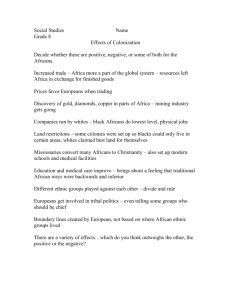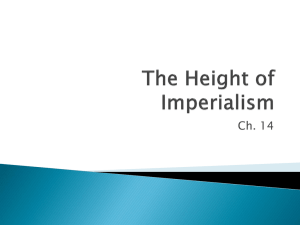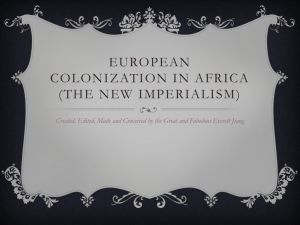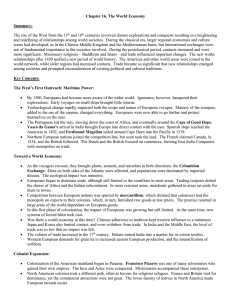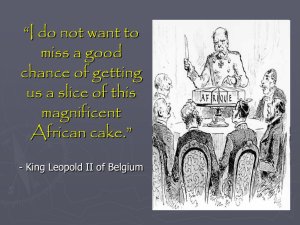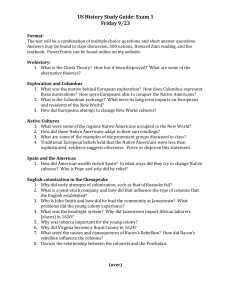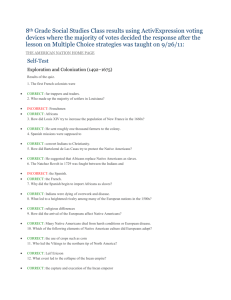European Partitioning Across Africa ppt and worksheets
advertisement
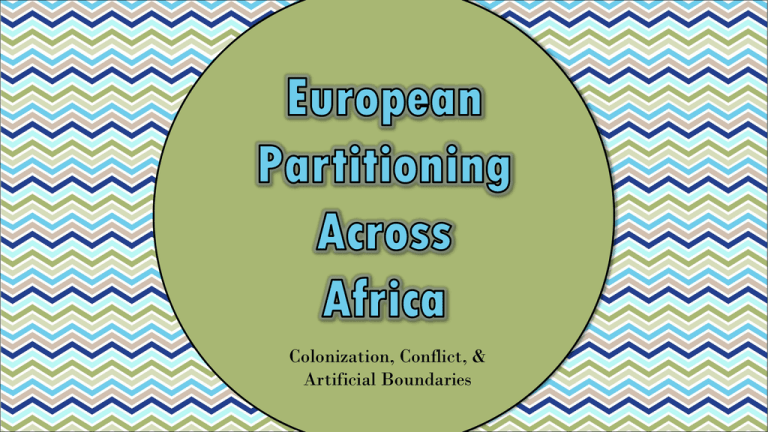
Colonization, Conflict, & Artificial Boundaries • Europeans first became interested in Africa for trade route purposes. • They were looking for ways to avoid the taxes of the Arab and Ottoman empires in Southwest Asia. • Sailing around Africa was the obvious choice, but it was a long voyage and could not be completed without “pit stops” along the way. • Europeans created ports in southern and eastern Africa so traders could restock supplies before crossing the Indian Ocean. • During the 16th century, Portuguese explorers became engaged in the African slave trade. • They kidnapped Africans and forced them to work on plantations and mines in their colonies in the New World. • Other European countries soon participated in the slave trade as well. • The trans-Atlantic slave trade lasted from the 1500s to the mid-1800s. • Even after the slave trade had ended, European interest in Africa was still going strong. • European countries saw that Africa was a continent full of vast natural resources and mineral wealth. • The end of the 19th century is called the “Age of Imperialism”, which refers to European countries competing for land and power. • Imperialism is a system were a strong country takes wealth and raw materials from another country. • A “strong” country was supposed to have many colonies to increase its wealth and importance around the world. • During this time, many European countries expanded their empires by aggressively establishing colonies in Africa so that they could exploit and export Africa’s resources. • Raw materials like rubber, timber, diamonds, and gold were found in Africa. • Europeans also wanted to protect trade routes. • During the 1800s, Europeans moved further into the continent in search of raw materials and places to build successful colonies. • Great Britain, France, & Germany fought over control of land that is now Egypt and Sudan. • Belgians took control of the Congo. • The natives often fought against the European powers; however, they often lost because the European weapons were superior. • The Zulu nation fought the British in South Africa and the Ashanti struggled to hold onto what is now Ghana. • Economic motivation played a large part in the colonization of Africa. • The 1800s was a time of great industrialization in Europe (Industrial Revolution). • Factories required raw materials that could be manufactured into marketable products. • When Europeans returned to Africa for more resources they brought back the manufactured goods and sold them to Africans. • Africa became a new market for Europe to sell goods. • Politics in Europe also led to the colonization of Africa. • Nationalism, a strong sense of pride in one's nation, resulted in competition between European nations. • No major nation wanted to be without colonies, which led to this “Scramble for Africa”. • The competition was particularly fierce between Great Britain, France, and Germany, the strongest European nations in the 1800s. • Christian missionary work gained strength during the 1800s as European countries were becoming more involved in Africa. • Many missionaries were supportive of the colonization of Africa because they believed that European control would provide a political environment that would help missionary activity. • The idea of “Christianizing” Africa also made many Europeans look favorably on the colonization of the continent. • By the 1880s, Great Britain, France, Germany, Belgium, Spain, and Portugal all wanted part of Africa. • To prevent a European war over Africa, leaders from fourteen European governments and from the United States met in Berlin, Germany, in 1884. • No Africans attended the meeting. • At the meeting, the European leaders discussed Africa’s land and how it should be divided. Berlin Conference • Going into the meeting, roughly 10% of Africa was under European colonial rule. • By the end of the meeting, European powers “owned” most of Africa and drew boundary lines that remained until 1914. • Great Britain won the most land in Africa and was “given” Nigeria, Egypt, Sudan, Kenya, and South Africa after defeating the Dutch Settlers and Zulu Nation. • The agreements made in Berlin still affect the boundaries of African countries today. Political Boundaries after Berlin Conference • European powers organized Africa’s population in ways to make the most efficient workforce, ignoring the natives’ cultural groups or existing political leadership at the time of colonization. • Sometimes they grouped together people who had never been united under the same government before. • Sometimes they divided existing groups of people. • The creation of these borders had a negative impact on Africa’s political and social structures by either dividing groups that wanted to be together or combining ethnic groups that were enemies. • Europeans placed colonies into administrative districts and forced the Africans to go along with their demands. • In order to establish their indirect rule, Europeans used local chiefs as their enforcers in the colonies. • Europeans also tried to assimilate Africans (have African people give up their own African customs and adopt European customs). • Protests and revolts were common and starvation and disease became widespread. • Europeans took the best land by force. • African farmers were forced to grow cash crops like cocoa and coffee, causing there to be a shortage of food in many areas of Africa. • Africans were forced to work under terrible conditions on plantations, railways, and logging. • In order to gain power, Europeans encouraged Africans to fight against each other. • New political boundaries caused ethnic groups to clash. • This has led to ethnic and political unrest in Africa today. • There have been over 50 ethnic conflicts in Africa since WWII as a result of the colonial lines drawn by Europeans. • By the mid-twentieth century, Africans began to openly oppose European control of their countries. • It was obvious that colonialism was not fair, as it only benefitted the Europeans. • Africans were tired of being treated like second-class citizens on their own land. • They soon begin to demand freedom for themselves… http://www.japanafricanet.com/directory/presidents/af ricanindependence.html “World’s Plunderers” Published - June 20, 1885
